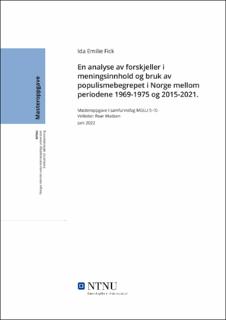| dc.contributor.advisor | Madsen, Roar. | |
| dc.contributor.author | Fick, Ida Emilie. | |
| dc.date.accessioned | 2022-07-07T17:22:20Z | |
| dc.date.available | 2022-07-07T17:22:20Z | |
| dc.date.issued | 2022 | |
| dc.identifier | no.ntnu:inspera:110859567:21974090 | |
| dc.identifier.uri | https://hdl.handle.net/11250/3003704 | |
| dc.description.abstract | I denne masteroppgaven undersøkes likheter og forskjeller i bruken og innholdet i begrepet populisme mellom to ulike tidsperioder, henholdsvis 1969-1975 og 2015-2021.Oppgavens problemstilling er som følger: En analyse av forskjeller i meningsinnhold og bruk av populismebegrepet i Norge mellom periodene 1969-1975 og 2015-2021. Jeg har også formulert en hypotese for oppgaven som antar at begrepet har blitt brukt som selvdefinisjon og at det ikke finnes noe endring i begrepet fra den første til den andre perioden. Min egentlige antakelse er at det finnes en betydelig forandring og at begrepet har gått fra å bli brukt som selvdefinisjon i den første perioden, til å i større grad bli brukt som skjellsord i den andre tidsperioden. Jeg har likevel valgt å formulere en hypotese om det motsatte med tanke på å finne ut om denne kan falsifiseres med referanser til min empiri.
Problemstillingen besvares ut fra datamateriale som er innhentet digitalt gjennom tidsskriftartikler. Den kvalitative empirien analyseres gjennom en idéanalyse med innslag av elementer fra argumentasjonsanalyse, og tolkes i lys av teori og forskning fra populismefeltet. I praksis vil denne oppgaven kunne fungere som nyttig forskning i forbindelse med populismen i Norge. I forbindelse med samfunnsfaget vil funnene i oppgaven spesielt være relevant for samfunnsfaglærere i undervisning i forbindelse med demokrati, medborgerskap og kritisk tenking.
Analysene viser at det har skjedd en endring i bruken av begrepet i meningsinnhold og bruken av populismen i de to analyseperiodene. Etter en sammenligning av analysene har jeg funnet at forskjellene bunner i at begrepet blir brukt i ulike kontekster. Eksempelvis brukes begrepet i stor grad i forbindelse med distriktspolitikk i første perioden, mens det i den andre perioden i stor grad brukes i forbindelse med spørsmålet om populismen og demokratiet er forenelig. Begrepet brukes ikke i stor grad som selvdefinisjon i noen av periodene, det brukes oftere til å harselere med andre. Analysene viser likevel at begrepets definisjon og mottakernes konnotasjoner har endret seg fra den første til den andre perioden. | |
| dc.description.abstract | In this master's thesis, similarities and differences in the use and content of the term populism between two different time periods, 1969-1975 and 2015-2021, are examined. The thesis' problem is as follows: An analysis of differences in meaning content and use of the concept of populism in Norway between the periods 1969-1975 and 2015-2021. I have also formulated a hypothesis for the thesis which assumes that the term has been used as self-definition and that there is no change in the term from the first to the second period. My real assumption is that there is a significant change and that the term has gone from being used as a self-definition in the first period, to being used to a greater extent as an insult in the second period.
The problem is answered from data material that has been obtained digitally through journal articles. The qualitative empiric is analyzed through an analysis of ideas with elements of argumentation analysis, interpreted in the light of theory and research from the field of populism. In practice, this thesis will be able to function as useful research in connection with populism in Norway. In connection with the social studies subject, the findings in the thesis will be particularly relevant for social studies teachers in teaching about democracy, citizenship and critical thinking.
The analysis shows that there has in fact been a change in the use of the term in content and the use of populism in the two analysis periods. After a comparison of the analyzes, I have found that the differences are since the term is used in different contexts. For example, the term is largely used in connection with district politics in the first period, while in the second period it is largely used in connection with the question of whether populism and democracy are compatible. The term is not widely used as a self-definition in any of the periods, it is often used to harass others. Despite that, the analyzes show that the definition of the term and the recipients' connotations have changed from the first to the second period. | |
| dc.language | nob | |
| dc.publisher | NTNU | |
| dc.title | En analyse av forskjeller i meningsinnhold og bruk av populismebegrepet i Norge mellom periodene 1969-1975 og 2015-2021. | |
| dc.type | Master thesis | |
